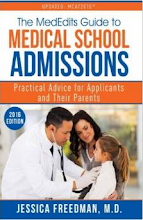
I recently contributed an article to The Student Doctor Network highlighting some topics that were discussed at the annual Association of American Medical Colleges Meeting. This article has broad appeal with lots of useful information for medical school and residency applicants.
As a mentor, I educate myself, and the medical editors with whom I work, to stay up to date with the trends and research in medical education. It is essential when hiring an admissions consultant, that their knowledge not be based only on anecdote and that they work (on their own time) to provide you with the most accurate guidance.
Click Here to read the article.
I assist with all aspects of the admissions process for medical school, residency and fellowship applicants.
Visit: www.MedEdits.com.












